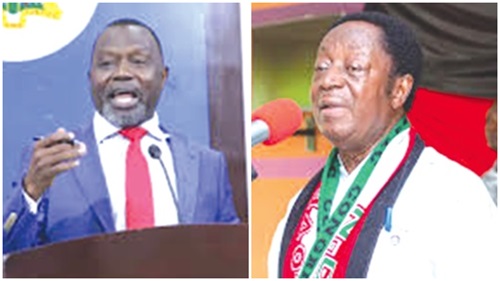ET me say this upfront - Ghana’s current Attorney General will probably not be the first nor the last to use administrative discretion under the constitutionally granted power in Article 88(3) to discontinue criminal prosecution.
I am sure the framers of the constitution had some legitimate basis for why it made this provision.
On July 22, through a press release, the Attorney General informed Ghanaians of his decision to enter nolle prosequi in the criminal case brought against Kwabena Duffuor and seven others which emanated from the banking sector clean-up.
And yes, the AG is not obligated to provide reasons for entering a nolle prosequi, a point often quickly made in response to any questions raised. So, credit to the AG for providing additional information that helps explain why the decision was made.
If my math is correct, this brings to a total, seven discontinued criminal cases by the current Attorney General.
As I follow the ensuing conversations in public spaces, it is the cases that involved the prosecution of certain officials of government during the first term of President John Dramani Mahama plus the most recent announced (Duffuor and 7 Others), that bring into sharp focus for reflection the potential unintended consequences of ‘nolle prosequi.’
Unintended consequences
First, Operation Recover All Loot (ORAL) featured prominently in the government’s 2024 election campaign.
Although the promised anti-corruption tool was primarily targeted at post-regime accountability where all loot, allegedly engaged in by appointees of the New Patriotic Party (NPP) government, would be recovered and punished, it created a public expectation of an expansive anti-corruption fight.
There is heightened public expectation to see results and for the anti-corruption fight to be applied in matters of in-regime accountability as well. I cannot help but worry whether some of the discontinued cases may inadvertently undermine faith in the government’s overall commitment to fighting corruption irrespective of one’s political standing or affiliation.
Second, it potentially turns any legitimate current efforts of post regime accountability into partisan warfare. It is not surprising to read the partisan undertones that appear to suggest that when the next turnover election happens, Ghanaians can expect same from a new Attorney General.
Should this happen, it unfortunately turns nolle prosequi into a partisan political tool for shielding and protecting persons from being held accountable for alleged wrongdoing in situations where they must.
This certainly cannot be a healthy development for our democracy.
Public sentiment
Third, it reinforces a growing public sentiment of a justice system that treats ordinary people differently compared to others.
This is based on what Ghanaians have expressed in the Afrobarometer.
In 2008, when the question was first asked “in your opinion, how often, in this country, do officials who commit crimes go unpunished?” 28 per cent answered “often/always.”
In the most recent round of the survey (2024), this increased significantly to 73 per cent.
Now compare that to how Ghanaians answered the same question, but this time framed as follows “In your opinion, how often, in this country, do ordinary people who break the law go unpunished?”
In 2008, 21 per cent answered “often/always.” In 2024, 26 per cent answered “often/always.”
Imagine then what the discontinuation of criminal prosecutions against people deemed to be officials potentially does in a context where there is a feeling that the justice system treats them differently than it does ordinary people?
These are some of the unintended consequences and the reason why I often advocate a narrow and very prescriptive form of discretion that we grant to public administrators.
It is not because I don’t trust public administrators to properly exercise discretion; it is simply because sometimes, well-intentioned decisions can result in unanticipated poor outcomes.
Where do we go from here?
This is not a call to the Attorney General to pledge no more “nolle prosequi.” Rather, it is a call to find ways to reconcile passing the legal test with the appearance test.
The legal test is easily passed in that a) the AG has the constitutional power to discontinue criminal prosecutions; and b) it is part of normal legal proceedings for the State to accept recovery, even if not 100 per cent, in exchange for lesser or even sometimes no punishment for alleged wrongdoing.
But it is in passing the appearance test – public perceptions- that a government wins or loses the goodwill of its citizens.
It may be tempting to describe perception as not being reality, but it has a powerful way of undoing governments.
It therefore cannot be ignored. Providing reasons for discontinuing cases, although not required, helps.
As announced, the AG will hold a press conference on July 28; another positive and helpful step in engaging the public.
But perhaps the punishment Ghanaians are demanding is more than just partial recovery. Ghanaians probably want the full loaf of bread and not just half of it.
The writer is the Director, Democracy Project

